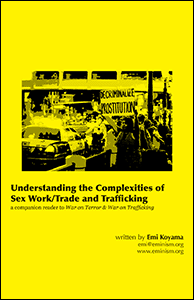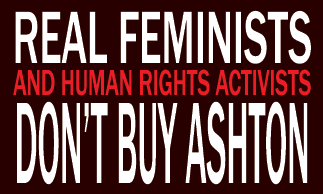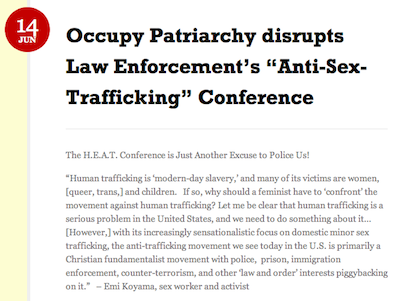Below is the Twitter exchange with the account “Manhattan Call Girl” (@StellaMarr) about her blog article, which I commented a couple of days ago. I am archiving her comments here because she seems to have deleted many of them.
emikoyama 8:18 PM – 31 May 12
are you really certain that people you name as “pimps” actually are? http://eminism.org/blog/entry/311 @StellaMarr
emikoyama 8:19 PM – 31 May 12
bcz sex workers and even trafficking victims sometimes end up with “promoting prostitution” charge even though they aren’t pimps @StellaMarr
emikoyama 8:21 PM – 31 May 12
if they are actual pimps, then, yes i agree with you. i’m weary of criminal record as source knowing how abusive legal system is @StellaMarr
Stella responds the next day:
StellaMarr 12:35 PM – 1 Jun 12
@emikoyama Between being trafficked & pimping = #bigdifference. It’s not something easily confused #sexworker #feminism
StellaMarr 12:37 PM – 1 Jun 12
@emikoyama I used primary sources — the personal sites of parties in question. http://wp.me/p2bR3Y-6Z
She does cite sources, but her sources do not indicate that people she is mentioning are “pimps” in any way, with the possible exception of the man who is said to be a partner of someone who owns a male escort service (who is also a sex worker himself).
emikoyama 1:04 PM – 1 Jun 12
@StellaMarr But you seem to be confused. Don’t you understand that “promoting prostitution” doesn’t mean pimping?
emikoyama 1:05 PM – 1 Jun 12
@StellaMarr Charge of “compeling prostitution” would mean pjmping. But “promoting” doesn’t. It can apply to lots of things beide pimping.
Stella seems annoyed, like I don’t know what I’m talking about.
I did read the article more than once, but still wasn’t convinced.
emikoyama 1:10 PM – 1 Jun 12
@StellaMarr For example, several working women sharing work space together for safety and to save expenses is “promoting.”
emikoyama 1:11 PM – 1 Jun 12
@StellaMarr driving someone or providing security is “promoting” even if it’s just friend and isnt making any money.
emikoyama 1:11 PM – 1 Jun 12
@StellaMarr Further, consider this: pimp asks girl to introduce other girls to recruit. She complies. Is she now just a pimp?
emikoyama 1:12 PM – 1 Jun 12
@StellaMarr I don’t know of any women you mention as pmps. I know them as sex workers. If they are in fact pimps, please give me more info.
emikoyama 1:13 PM – 1 Jun 12
@StellaMarr Because none of their criminal charges indicate that they are.
Now she is really getting irritated.
StellaMarr 1:15 PM – 1 Jun 12
@emikoyama everyone knows we hate m or f pimps. You are boring me with these silly posts most guys prefer you go to hotel or thr house
StellaMarr 1:15 PM – 1 Jun 12
@emikoyama ZZZZZZZZZzzzzzzzzz bored
I was shocked that she would publicly display disrespect toward me rather than responding to my concern which was quite simple.
emikoyama 1:16 PM – 1 Jun 12
@StellaMarr why do you need to insult me like this? i thought you were my sister. i dont like pimps any more than you do.
When I searched for her Twitter name, I found a lot of people calling her a liar and being rude toward her, so I could understand that she thought I was just one of them. I am not. I think I’ve kept everything pretty respectful. She changes her tone a little bit.
StellaMarr 1:20 PM – 1 Jun 12
@emikoyama then quit defending pimps darling, sorry I just get bored with these ridiculous hairsplittings — wish you well xo
Great, let’s go back to the actual content of our disagreement.
emikoyama 1:22 PM – 1 Jun 12
@StellaMarr not defending pimps. i just think you are wrong to determine they wre pimps based on evidence we have.
emikoyama 1:24 PM – 1 Jun 12
@StellaMarr because i can just imagine how horrifying it is to be falsely accused of being pimp. it would make me wanna die if it were me.
emikoyama 1:24 PM – 1 Jun 12
@StellaMarr but otherwise i totally agree: pimps arent sexworkers and dont belong in sw groups.
Stella doesn’t contradict anything I say, or provide any further evidence.
StellaMarr 1:28 PM – 1 Jun 12
@emikoyama Lets agree to disagree —
StellaMarr 1:29 PM – 1 Jun 12
@emikoyama Based on evidence we have they should not be founding &leading sex worker unions/activist orgs — conflict of interest #feminism
We can’t just “agree to disagree” about whether or not someone is a pimp. That is a serious allegation and cannot be made lightly.
emikoyama 1:54 PM – 1 Jun 12
@StellaMarr seriously, don’t we need to be more careful about calling people pimps? criminal charges you site don’t equal pimping.
emikoyama 1:59 PM – 1 Jun 12
@StellaMarr pimps can be convicted of pandering or promoting prost but not everyone convicted of these are pimps. it’s that simple.
emikoyama 2:00 PM – 1 Jun 12
@StellaMarr i am also concenrned and speaking out about conflict of interest within sw movement. i wrote about some examples in my blog.
emikoyama 2:02 PM – 1 Jun 12
@StellaMarr to me, calling someone a pimp is among the worst thing you can say about someone. i dont want anyone to be called that wrongly.
Stella has not made any further responses since then, and appears to have deleted most of her replies toward me.
I understand that it is difficult to be speaking out as a survivor. I also understand that everyone says things on social media that they regret later. But her blog post is spreading extremely damaging information about sex workers’ movement that isn’t true, something that are being used to discredit and marginalize a whole movement that is fighting violence and exploitation of people in the sex trade.
If she regrets making any of the comments I quote above, I ask that she become transparent about it. Further, I ask that she retract the original blog post unless she can provide actual evidence that the people she name are “pimps.” I’m sure she understands how horrible it must feel when someone “expose” you as a pimp when you actually are not.
June 2, 2012 Update
At least one person who is mentioned as a “pimp posing as a sex worker activist” has responded, stating that she has never been a pimp. I don’t personally like her rhetoric (especially about Stella’s brain being damaged), but I can empathize: I would be pretty angry too if someone called me a pimp or flat-out negated authenticity of my experiences.
June 2, 2012 Update 2
Another woman told me that Stella called her a pimp, even though she wasn’t at all. She found the allegation particularly offensive because she has had a pimp herself. I wrote the following plea:
emikoyama 9:45 PM – 1 Jun 12
@StellaMarr This is a personal and emotional plea. Please, please, stop calling people “pimps” when they aren’t.
emikoyama 9:46 PM – 1 Jun 12
@StellaMarr Multiple people you named as pimps have now stated they aren’t pimps. One woman says she had a pimp too. You have no evidence.
emikoyama 9:46 PM – 1 Jun 12
@StellaMarr Your “source” is criminal cases that don’t equal pimping. Pandering and promoting can and do apply to people who are not pimps.
emikoyama 9:46 PM – 1 Jun 12
@StellaMarr I’m sure you understand how offensive it is to call someone who was exploited by a pimp a “pimp.” If it were me I’d be suicidal.
emikoyama 9:46 PM – 1 Jun 12
@StellaMarr This is beside politics. We can disagree about everything else, but this is one thing survivors don’t do to each other.
emikoyama 9:48 PM – 1 Jun 12
@StellaMarr Okay, maybe I’m wrong and they are pimps, though evidences don’t seem to support that. Perhaps. I’d rather err on that side.
emikoyama 9:50 PM – 1 Jun 12
@StellaMarr …than taking the risk of erroneously labeling survivors “pimps.” It is extremely traumatic.
I don’t know what’s going on in her head now, but I really hope that she hears me.
June 9, 2012 Update
After posting above, Stella asked me to remove this page because it made her feel unsafe. I do not want to make her feel unsafe, so I agreed to unilaterally remove this page as a demonstration of good faith. But at the same time, she was making many women unsafe by falsely labeling them “pimps,” and I asked her to delete the false allegations. I told her that I would permanently remove this page altogether if she did.
Stella continue to insist that her allegations were supported by evidence, but did not provide any evidence beyond what she included in her blog post. She also asked me not to contact her again. I agree not to contact her unless she contacts or mentions me first, which unfortunately made it impossible to engage with her further. I have now reinstated all exchanges I removed once because while I do not want to make her feel unsafe, I cannot ignore how she is making many other women unsafe with her false allegations.
Below is a statement I posted to this blog while the content was temporarily removed.
June 4, 2012 Update
After posting this entry, @StellaMarr asked me to remove this page. Well that’s not entirely accurate: what happened was that she claimed that she had asked me to remove it, even though I did not receive any such request. But okay, so she wants this page taken down–and I am willing to comply with that, even though I was merely quoting the comments she posted to Twitter.
The reason I am honoring such request is because she is a survivor and that means she is my sister and I feel loyal to her. I do not want to publicly criticize or expose another survivor even when she sort of deserves it, considering the fact she is making outrageous false allegations against other women in the sex trade that they are pimps. These women she is hurting are also my sisters too, and I want to defend them as much as I want to defend Stella.
So here’s what I decided to do: I’m going to unilaterally remove all the comments she made on twitter from this page as a gesture of good faith. And as I do so, I ask that she takes down false allegations against other women, or provide evidences to support her claim. “Pandering” and “promoting prostitution” charges are not evidences of someone being a pimp for the reasons I explained before.
After removing her tweets from this page, I will wait for 24 hours. If she does not remove her false allegations against other women and stop making similar attacks against my sisters, I have no choice but to conclude that she is acting in bad faith and reinstate this page to the original state.
Stella says that it is not a personal attack to point out that someone is a pimp. Well, it is definitely a personal attack when the allegation is false. My blog post, on the other hand, is not a personal attack against her: I am simply quoting her actual words to point out why her allegations are false.
I wish I didn’t have to criticize another survivor. In fact, if she would remove the false allegations and keeps it off her blog and tweets for long enough to convince me that she won’t do the same thing again, I will remove this page altogether including this statement itself. That is how loyal I feel toward a fellow survivor.
But if she does not remove her false allegations, and continues to make similar allegations against other survivors and sex workers who are not pimps, I will have to stop letting my loyalty to her as a fellow survivor get in the way of honoring my loyalty to these women who are being hurt by her actions.
Please note that I never defended the owner of male escort service she mentions in her article. It is clear that he and his partner are owners/managers, and while some people disagree about the use of the word “pimp” to describe managers who, like employers in other industries, hire people to work for them without coercing or exploiting them, and even though they are sex workers themselves as well as managers, I think Stella has a valid point about challenging the conflict of interest. Plus, I don’t like bosses in any other industries so I have no reason to like bosses in the sex industry either. So I am not defending the two men she mentions in the beginning of her article.
Other people she attacks, however, are probably not pimps, under any definition. Pimps can be charged with pandering or promoting prostitution, but not everybody who is charged with these crimes are pimps, because people can be found guilty of these crimes even if they do not control anyone else and do not even profit from another person’s sexual labor. I don’t want Stella to feel unsafe because of what I write here, but I also can’t let her continue to threaten safety of other women who do not deserve to be hurt.
Finally: Stella wants me to stop communicating with her on Twitter, and I respect that. I am going to post a final tweet to let her know this URL to give her an opportunity to act in good faith. Her refusal to engage with me directly makes it difficult for me to defend other women who are hurt by her actions without posting it publicly, which might make her feel unsafe. I struggle with this dual loyalty, but in the end I will have to side with people who are at the receiving end of the undeserved attacks rather than the other side. Stella, I wish you would not put me in that position.



